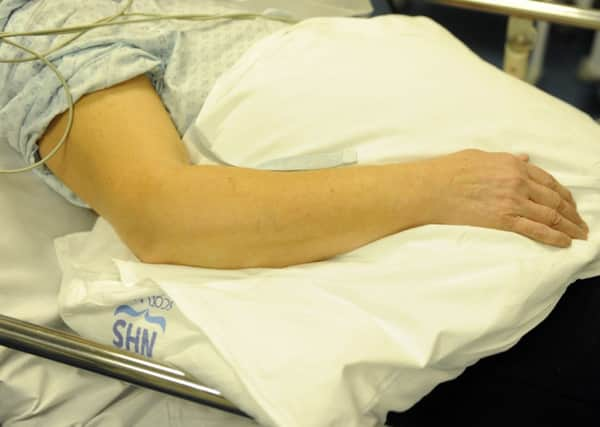Neglect of bed sores ‘led to patient’s death’


The Scottish Public Services Ombudsman (SPSO) investigation concluded that the poor care led to the sores which caused her death.
Ombudsman Jim Martin said something had “gone badly wrong” when a patient died from bedsores in a Scottish hospital in the 21st century.
Advertisement
Hide AdAdvertisement
Hide AdNHS Lothian apologised for the failings in the woman’s care and said it was implementing new measures for bedsores.
The patient – referred to as Mrs A – was admitted to Edinburgh Royal Infirmary (ERI) after a fall at home in September 2012. She was found to have a fractured left hip and pelvis, leaving her unable to move without help and with reduced feeling in her feet.
The day after her admission, her skin was assessed for the risk of bedsores, first being given a high risk score and then a lower one. No preventative action was taken at the hospital to reduce her risk of pressure sores or other skin problems.
In October, she was transferred to the Liberton Hospital in Edinburgh for rehabilitation. She continued to suffer pain in her hip and needed help moving, but no concerns were raised by staff in relation to skin care or potential pressure ulcers. Later, bruises were noted on her heels, and her risk score increased.
A referral was made to a tissue viability nurse (TVN) specialist on 2 November, but Mrs A was not seen by the nurse for another four weeks.
By this stage, staff had started to note areas of dying tissue and dressings were applied.
She was later transferred to a third hospital and then to a nursing home in Perth. She died six weeks after being discharged, with the primary cause of death listed as osteomyelitis – infection of the bone. The pressure sore on her left heel was listed
as contributing to her death.
The ombudsman’s health advisers were critical of the care Mrs A received, including the time it took for her problems to be identified and assessed.
Advertisement
Hide AdAdvertisement
Hide AdOne adviser said the poor care the patient received at the ERI and Liberton led to the development of the pressure ulcer that resulted in her subsequent death from bone infection.
The ombudsman’s report said: “While recovery from her fractures would have been difficult, if she had not developed the pressure ulcer on her heel she would have had a better chance of learning to walk again, and enjoyed a longer period of better health.
“Ultimately, the poor care that Mrs A received led to the development of a pressure ulcer that caused her death.”
He upheld a complaint from the patient’s son that NHS
Lothian had failed to take steps to prevent the sores and then failed to manage them properly.
Mr Martin expressed frustration that he was having to highlight the issue of bedsore care.
“Something has gone badly wrong when, in a Scottish hospital in the 21st century, a patient dies from poorly managed pressure sores,” he said. “This is not the first time I have raised the issue of poor management of pressure sores, which results in needless suffering and is quite simply an unacceptable and abject failure in care.”
Sarah Ballard-Smith, nurse director at NHS Lothian, said: “We have apologised to the family of Mrs A.
“We accept the ombudsman’s recommendations and have already put them into practice.”